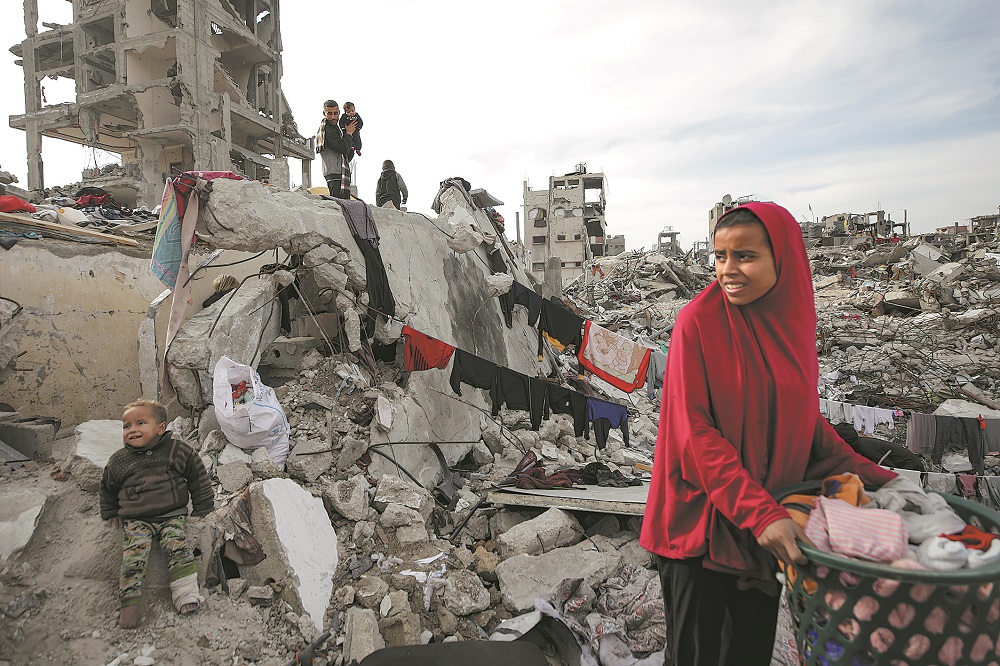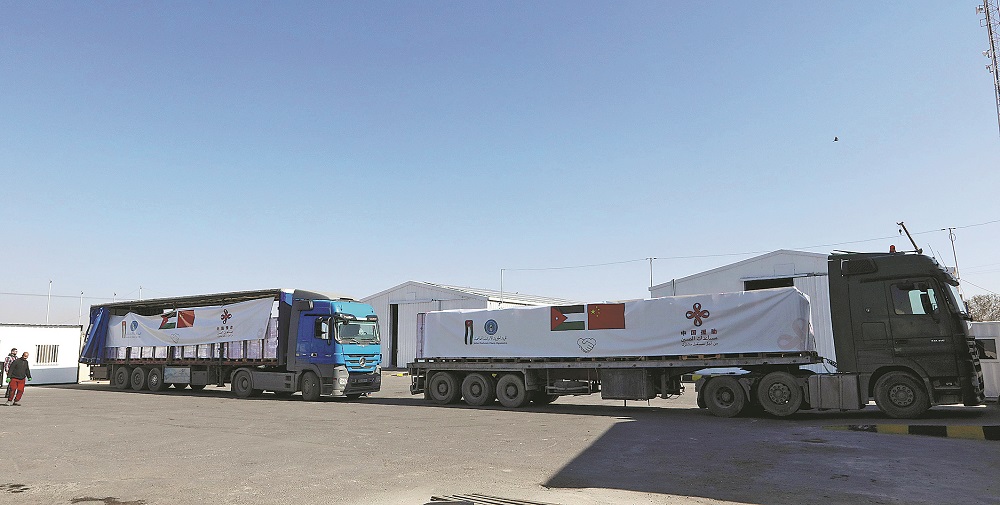
Members of the Nijim family hang laundry on the ruins of their house amid widespread destruction caused by the Israeli offensives in Jabalia, Gaza Strip, on Tuesday. JEHAD ALSHRAFI/ASSOCIATED PRESS
Hamas has reaffirmed its willingness to implement further stages of the Gaza cease-fire agreement with Israel, proposing swapping all Israeli captives and Palestinian prisoners in "one go", with an aim of reaching a permanent truce and a full Israeli pullout, media reports said.
In an acceleration of such a process, Khalil al-Hayya, leader of Hamas in Gaza, said the group would return the bodies of four hostages, including the remains of two boys, on Thursday and hand over six hostages on Saturday. Israeli Prime Minister Benjamin Netanyahu's office subsequently confirmed a deal was reached in Cairo to secure the release.
Israeli Foreign Minister Gideon Sa'ar said negotiations for the second phase of talks "will happen this week", but demanded the "complete demilitarization of Gaza", saying his country would "not accept the continued presence of Hamas" there.
In a statement, Hamas rejected Israel's call for its disarmament and removal from the Gaza Strip, with spokesman Hazem Qassem calling such a condition "ridiculous psychological war".
In the past few weeks, Israel has sent mixed signals about its engagement in talks over the next stage of the three-phased truce, which came into effect on Jan 19.
In addition, the fragile cease-fire deal has been overshadowed by US President Donald Trump's call for Palestinians to be permanently moved out and for Gaza to be taken over by the United States. The plan has been rejected by Palestinians, Arab states and Washington's Western allies.
On Wednesday, UAE President Sheikh Mohamed bin Zayed Al Nahyan rejected any attempts to displace Palestinians from their land during a meeting with US Secretary of State Marco Rubio, state media reported.
The Emirates News Agency said the UAE leader linked Gaza's reconstruction to a broader push for a "comprehensive and lasting peace", reiterating the UAE's commitment to a two-state solution as critical to regional stability.

Trucks loaded with Chinese aid get ready to set off from a warehouse in Jordan on Tuesday. The aid consists of 60,000 food parcels. MOHAMMAD ABU GHOSH/XINHUA
The UAE president warned that further escalation risked destabilizing the region, urging intensified efforts to contain the conflict.
China's Foreign Ministry spokesman Guo Jiakun said on Wednesday that China has provided 60,000 food parcels as emergency humanitarian aid to Gaza through Jordan.
The transportation of about 12,000 parcels has started, Guo said.
"As a responsible major country, China will continue to work with the international community and make relentless efforts to ease the humanitarian crisis in Gaza and achieve lasting peace in the Middle East," he said.
Echoing remarks of Chinese Foreign Minister Wang Yi at the United Nations headquarters on Tuesday, Guo said the Gaza conflict should not be marginalized.
The most urgent task is to promote the sustained and effective implementation of the cease-fire deal, and facilitate future negotiations in a constructive manner, Guo said.
The final solution to the Palestinian question lies in the two-state solution and the peaceful coexistence of Palestine and Israel, the spokesman said.
Qatar, a key mediator in the Gaza conflict, said on Tuesday that Palestinians — not outsiders — must decide the territory's future. "It is a Palestinian question on who represents the Palestinians in an official capacity and also the political groups and parties in the political sphere," said Majed al-Ansari, its foreign ministry spokesman.
Since the conflict began on Oct 7,2023, Israel's military operation has killed nearly 48,300 Palestinians, according to Gaza's authorities. The offensive also destroyed vast areas of Gaza and displaced most of its population of 2.3 million.
Rebuilding Gaza could cost $53.2 billion over the next 10 years, according to a report released on Tuesday by the World Bank, the UN and the European Union. The report identified almost $30 billion in damage from the conflict, nearly half reflecting the destruction of homes.
Egypt's President Abdel Fattah El-Sisi was expected to bring a draft Arab plan to Riyadh that may include up to $20 billion from the region for reconstruction, Reuters reported, citing two Egyptian security sources.
Emirati academic Abdulkhaleq Abdullah said it may be a good incentive for Trump to accept the plan. "Trump is transactional so $20 billion would resonate well with him. This would benefit a lot of US and Israeli companies."
Wang Qingyun in Beijing, agencies and Xinhua contributed to the story.